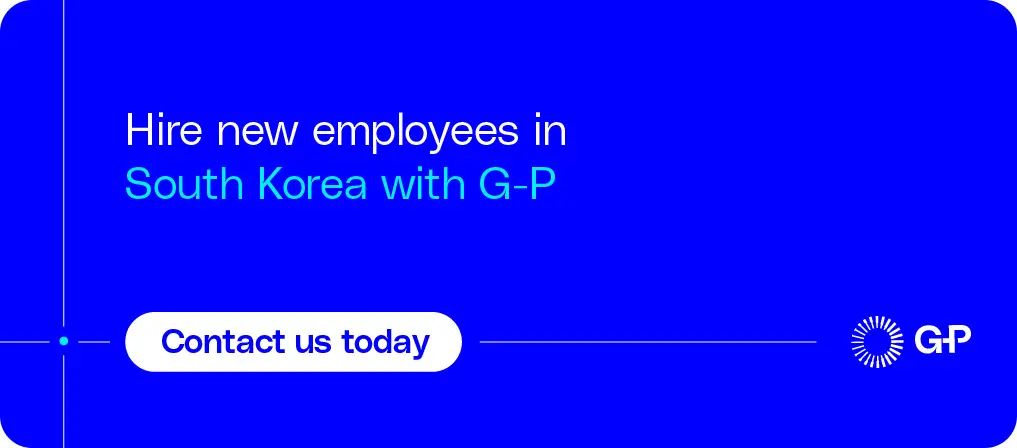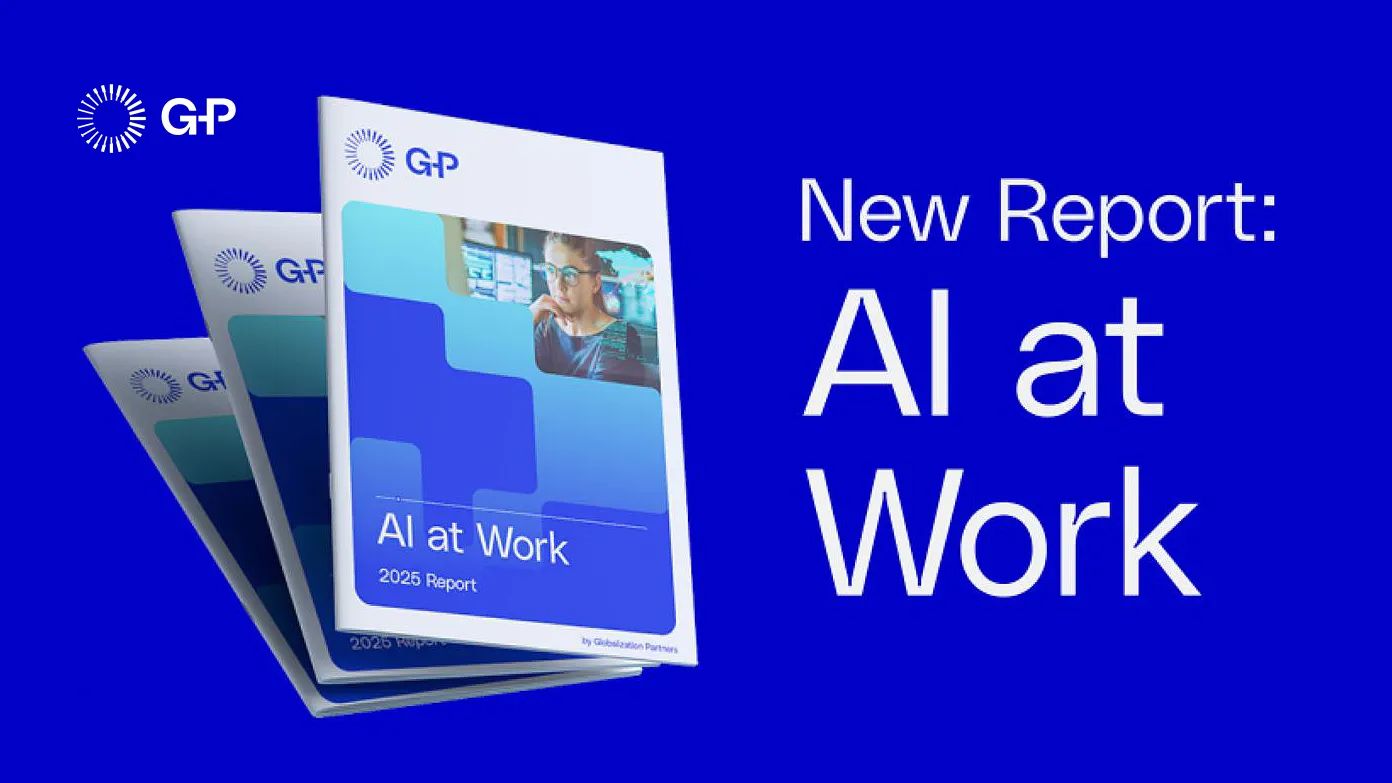South Korea is an excellent prospect for global business expansion. The country has a large economy, a highly educated population, and free trade agreements with the U.S., U.K., and European Union.
Before expanding to South Korea, you’ll need a solid understanding of the tax laws, working hours, paid holidays, and other requirements under the Labor Standards Act. Our guide will tell you everything you need to know about hiring in South Korea.
What to know before hiring in South Korea
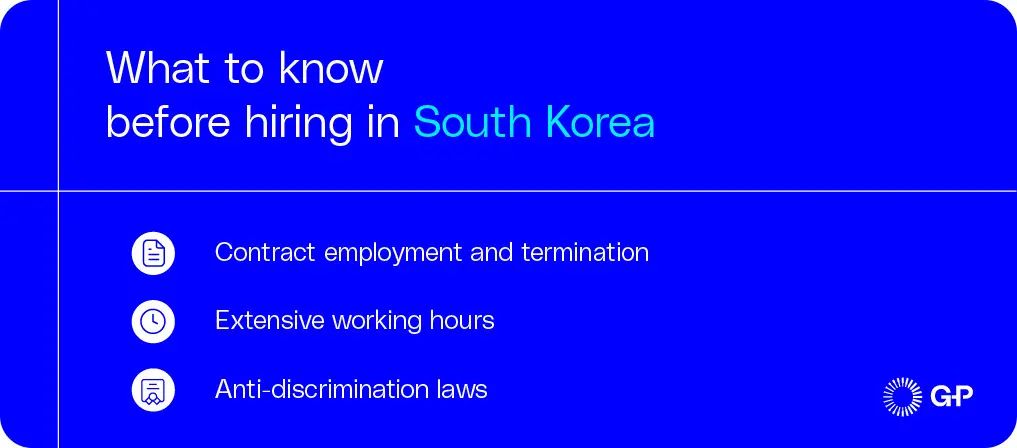
If you’re expanding your business into South Korea for the first time, there are important legal requirements to be aware of. These norms and laws influence hiring practices in South Korea and many aspects of the employer-employee relationship.
If you’re unsure where to begin, G-P Gia™, our AI-powered global HR agent, can answer your toughest compliance questions across 50 countries — including South Korea — and all 50 U.S. states. Reduce your reliance on outside counsel and cut the time and cost of compliance by up to 95% with Gia.
Let’s take a look at seven things to know about hiring in South Korea.
1. Employment contracts
The Labor Standards Act lays out certain standards for employment contracts. Contracts should be in writing and in the Korean language. They should contain the following information:
-
Job description
-
Salary
-
Additional compensation
-
Benefits
-
Work hours
-
Paid leave
-
Notice and termination requirements
The structure of South Korean contracts has changed over the past several years. Historically, South Korea relied on indefinite contracts, and most employees worked under these contracts until retirement. In the past decade, fixed-term, temporary, and part-time contracts have become more common. Here are a few facts to note about these contract structures:
-
Fixed-term contracts can be extended for up to two years.
-
Part-time contracts entitle employees to the same benefits as full-time workers, adjusted according to the hours worked.
-
Employers must provide a 30-day notice or pay in lieu of notice for termination, even for short-term contracts.
G-P EOR has an Employment Contact Generator to help you draft compliant employment contracts that meet all legal requirements and best practices in South Korea.
2. Payroll taxes
All employees in South Korea belong to a mandatory social security system. Employers contribute 4.5% toward old age, disability, and survivor’s benefits. Employees contribute 4.5% of their gross monthly income as well. Employers pay 1.05% to 1.65% toward unemployment benefits.
South Korea’s National Health Insurance (NHI) program provides health coverage for all citizens. Employers and employees each pay half of the required contribution of 8.008%.
Companies also pay between 0.56% to 18.56% (depending on the assessed level of risk inherent in the work) to the worker’s compensation fund. When considering these deductions, remember you can streamline the entire employee lifecycle — including payroll — for your team members in South Korea with G-P EOR. Pay your global teams in 150 currencies and easily add bonuses, commissions, and exceptions in just a few clicks.
3. Minimum wage and working hours in South Korea
Employees work an average of 1,915 hours per year. South Korea ranks fifth among OECD countries for longest average work hours. Employees can work a maximum of 52 hours per week — 40 standard hours and up to 12 overtime hours. Overtime work is compensated at a premium rate of at least 150% of the employee’s regular hourly wage. This applies to any work performed beyond the standard 8 hours per day or 40 hours per week.
South Korean law also requires companies to give employees at least one paid day off per week, generally Sunday. Many professionals work a half-day on Saturdays.
In 2025, the minimum wage in South Korea is KRW 10,030 per hour.
4. Paid leave
Only May 1 — Labor Day — is a mandatory paid holiday in South Korea. In practice, most employers treat other national holidays as paid holidays. Those holidays include:
-
New Year’s holidays
-
First day of the first lunar month
-
Independence Day
-
Children’s Day
-
Buddha’s Birthday
-
Memorial Day
-
15th day of the eighth lunar month
-
Harvest Festival
-
National Foundation Day
-
Hangul Day
-
Christmas Day
Employees who work at least 80% of their scheduled days a year can take 15 days of paid annual leave after completing one year of service. For every two years of continuous work, they earn one extra day of leave, up to a maximum of 25 days. Employees who have less than a year of service earn one day of paid leave for each full month they work.
Under South Korean law, employers don’t have to provide sick leave. Many companies choose to provide paid sick leave regardless. The Labor Standards Act only requires businesses to provide paid leave for injuries or illnesses sustained on the job.
Pregnant employees are entitled to 90 days of maternity leave in South Korea and must take at least 45 consecutive days after giving birth. The leave allowance increases to 120 days for multiple births. Depending on the company’s size, employers may pay the maternity leave directly or seek assistance from employment insurance.
As of February 2025, fathers are entitled to 20 days of paid paternity leave. This leave can be taken within 120 days following the child's birth and can be divided into three periods to accommodate needs. Employers must pay the employee's wage.
Employees are also entitled to up to 18 months of parental leave per child. Either parent can take this leave and divide it into multiple periods. The government provides financial support during this leave, with compensation rates varying over the duration of the leave.
You can easily administer benefits plans with G-P EOR. Our in-house experts continuously monitor employment laws to meet country-specific regulations and norms. Build and manage benefits plans through our platform to provide a smooth employee experience.
5. Anti-discrimination law and interview restrictions
The National Human Rights Commission of South Korea prohibits discrimination based on the following attributes:
-
Age
-
Gender
-
Race
-
Ethnicity
-
Religion
-
Sexual orientation
-
Disability
-
Social status
-
Marital status
-
Region of origin
-
Nation of origin
-
Political opinion
-
Criminal record
-
Medical history
-
Academic career
To curb discrimination and nepotism practices, South Korea passed a blind hiring act that restricts the questions companies can ask in employment interviews. Prospective employers with 30+ employees must refrain from inquiring into the following topics or face penalties of up to KRW 5 M:
-
National origin
-
Marital status
-
Family members
-
Property ownership status
-
Physical appearance, including weight and height, unless relevant to the job duties
6. University recruitment
Unemployment in South Korea is relatively low, standing at 2.7% . But unemployment rates for those aged 29 and under is 7.5%. If you’re hiring for junior roles, consider recruiting university graduates.
You can work with South Korea’s most prestigious universities to find emerging talent. The country’s top three universities — Seoul National University, Korea University, and Yonsei University — host large recruiting events a few times a year.
7. Employment termination
South Korean law requires companies to draft contracts that include notice periods and severance clauses.
South Korea isn’t an at-will employment country. If you want to terminate an employee’s contract, you need a just cause. You can either provide 30 days of notice or pay the employee for 30 extra working days.
Employees are entitled to severance after one year of employment. The standard amount of severance pay is one month’s salary for each year of service.
Employees who believe they’ve been unfairly dismissed can file a claim with the Labor Relations Commission. If successful, they could be reinstated in their position or awarded monetary compensation.
Top hiring hubs in South Korea
Some South Korean cities are known for particular industries. Knowing what each city has to offer can help you channel your hiring efforts to the right place and fill roles faster.
The top talent hubs in South Korea are:
-
Seoul is the largest city and capital of South Korea. It’s the country's main center for business, finance, and technology. Major companies, such as Samsung, SK Hynix, and Hyundai Mobis, are based here. This creates a large talent pool in industries like semiconductors, electronics, and software development.
-
Busan is South Korea's largest port city and the world's sixth-largest container port by volume. It’s a key center for shipbuilding, shipping, and logistics. The workforce here includes naval architects, marine engineers, logistics specialists, and supply chain experts.
-
Daejeon is often referred to as South Korea's Silicon Valley. It hosts KAIST (Korea Advanced Institute of Science and Technology), numerous government research institutes, and Daedeok Innopolis, a major hub for science and technology.
-
Ulsan is South Korea's main industrial city. It excels in industries like petrochemicals, steel, shipbuilding, and automotive manufacturing.
-
Daegu is a top hub for robotics, automotive parts manufacturing, and textiles.
Key industries in South Korea
Understanding South Korea’s main industries helps you benchmark salaries and benefits. You can use this insight to make smart choices about where to invest and grow your workforce. The main industries in South Korea include:
-
ICT: South Korea is a global leader in high-tech manufacturing and digital technology. Major companies, such as Samsung, LG, and SK, are based here. The country offers high-speed internet access, talent development initiatives for high-tech industries, and incentives for international experts. Specialist talent includes cybersecurity experts, machine learning engineers, and software developers.
-
Automotive and future mobility: South Korea is a leading producer of cars, with Hyundai and Kia as its primary brands. The industry is rapidly transitioning towards electric vehicles (EVs), autonomous vehicles, and Urban Air Mobility (UAM). Specialist talent includes engineers for EVs and batteries, autonomous driving, and robotics.
-
Biotechnology and biohealth: Strong investment from both the government and private companies is fueling industry growth. The sector mainly focuses on pharmaceutical drugs, biopharmaceuticals, medical devices, and health technology. Cities like Daejeon are key centers for this industry. Specialist talent includes bioprocess engineers, research scientists, and clinical research professionals.
-
Shipbuilding and maritime: South Korea is one of the world's leading countries in shipbuilding. It’s known for extensive shipyards, including HD Hyundai Heavy Industries and Samsung Heavy Industries. The industry’s focus is on high-value ships, smart ships, and eco-friendly technologies. Specialist talent includes welders, logistics and supply chain experts, and naval architects.
Financial services: South Korea has a well-developed financial market. While large local banks have traditionally dominated, the government is encouraging digitalization and innovation in fintech. Specialist talent includes fintech developers, cybersecurity experts, and financial risk professionals.
Cost of hiring an employee in South Korea
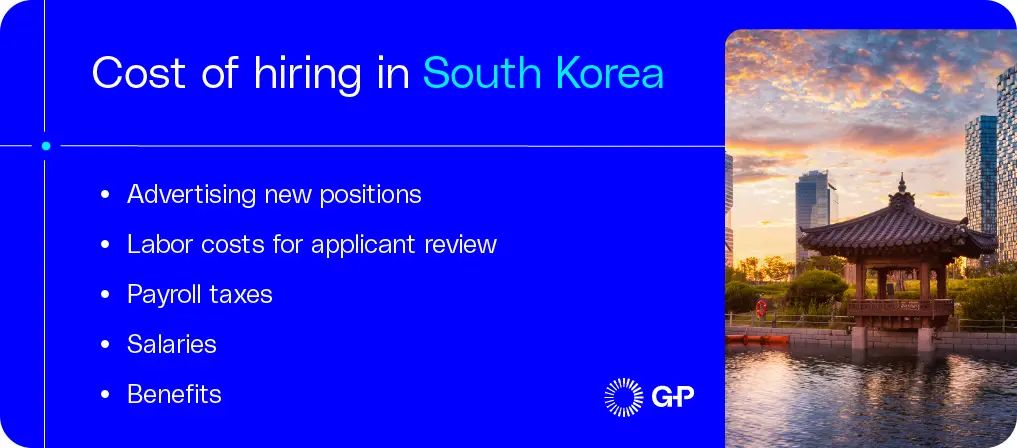
Whether you’re hiring one employee or an entire team in South Korea, expenses are inevitable. Budget for the following:
-
Entity setup (unless you partner with an employer of record)
-
Job advertisements
-
Labor costs for applicant review
-
Payroll taxes
-
Travel
-
Translator (if applicable)
According to G-P Verified Sources fromGia, the total annual employer burden rate in South Korea, which includes costs triggered on top of salaries, is between 9% and 12% for most industries. This can be more in high-risk sectors due to the different compensation premiums.
Hiring practices in South Korea
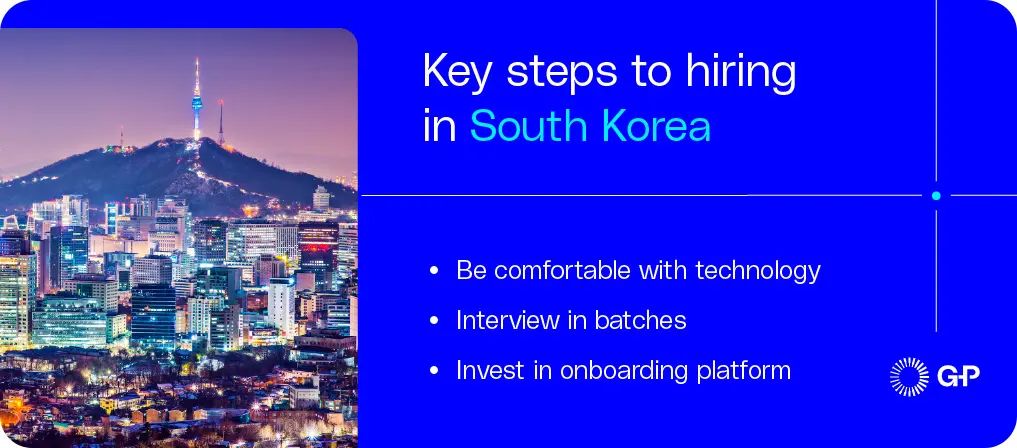
Hiring in South Korea is generally straightforward. These best practices can help you tailor your approach to a new culture:
-
Use the Korean language and currency: Most people in South Korea study English in school. Even so, it’s best practice to write offer letters and contracts in Korean, and provide salary information in Korean won. This sets a welcoming tone and communicates your commitment to making your new South Korea hires feel comfortable.
-
Focus on skills-based recruitment: South Korea’s anti-discrimination laws like the Labor Standards Act and the Equal Employment Opportunity and Work-Family Balance Assistance Act protect job seekers during the hiring process. Employers can’t discriminate based on gender, age, nationality, religion, social status, marital status, pregnancy, disability, or employment status. Make sure job postings focus solely on job-related qualifications. Avoid specifying details like age, gender, or physical appearance unless these are necessary for the role.
-
Embrace local business etiquette: As you work with new hires, focus on building strong relationships while observing respectful formalities. Consider working with South Korean business experts who can help guide your team-building strategies.
-
Check for Collective Bargaining Agreements (CBAs): Although CBAs are less common in South Korea than in many other countries, a few exist. Be sure to research what CBA, if any, governs your industry and the requirements it imposes.
What does a company need to hire employees in South Korea?
Make sure you cover these essentials before expanding your team in South Korea:
-
Choose your method of incorporation.
-
Develop a company seal.
-
Open a bank account.
-
Invest at least KRW 100 million.
-
Apply for a trade visa.
-
Register your company.
-
Pay for social security registration.
-
Select and open an office (if applicable).
-
File rules of employment
Setting up a South Korea subsidiary can take weeks or months. Use G-P EOR to hire full-time employees in South Korea without setting up your own entity. Build your team in South Korea at a lower cost and with peace of mind that you’re doing so compliantly.
Hiring independent contractors in South Korea
Working with independent contractors in South Korea can be a cost-effective way to test the market and build a presence without the commitment of full-time employees. Contractors based in South Korea understand local consumer behavior, rules, and business practices. They’ll be ready to start working quickly with their own equipment and established work processes.
Hiring contractors allows you to easily adjust your workforce based on your business needs, without the complexities and costs of employment.
Before you enter an agreement with an independent contractor in South Korea, consider the following:
1. Employees vs. independent contractors
In South Korea, the Labor Standards Act (LSA) governs employees. The LSA provides statutory protections and benefits to employees, including severance pay, paid leave, and social insurance enrollment. Contractors operate under the Civil Code. As self-employed individuals, contractors enjoy greater autonomy and manage their own tax and social insurance . Employees typically work under the employer's direction and supervision. Contractors work on a project basis and decide how, when, and where they perform their work.
2. Penalties for misclassification
Classifying someone as a contractor when they’re not can lead to severe penalties. If misclassification occurs, you may need to:
-
Pay backdated employee benefits, including social insurance contributions, severance pay, paid leave, and health insurance.
-
Face administrative fines and tax penalties.
-
Deal with reputational damage that can hurt your ability to attract talent.
3. How to pay contractors in South Korea
G-P Contractor™ takes away the messy, time-consuming process of hiring and paying international contractors. You can create and issue contracts and pay contractors with just a few clicks, all while ensuring a compliant process.
Hire employees and contractors in South Korea with G-P
Our SaaS and AI-powered products – EOR, Contractor, and Gia – help companies of all sizes build and manage global teams.
With more than a decade of experience, the largest team of HR, legal, and compliance experts, and a global proprietary knowledge base, G-P is the recognized leader in global employment.
Make your expansion to South Korea easier with G-P. Contact us or book a demo today.
